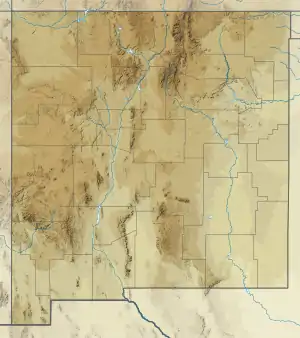Redonda Formation
The Redonda Formation is a geologic formation exposed in eastern New Mexico.[1] It contains vertebrate fossils of the late Triassic Period.[2] Fossil theropod tracks have been reported from the formation.[3]
| Redonda Formation Stratigraphic range: Norian ~221–206 Ma | |
|---|---|
| Type | Formation |
| Unit of | Chinle Group |
| Sub-units | Duke Ranch, Quay, Red Peak, San Jon Creek & Wallace Ranch members |
| Underlies | Entrada Formation |
| Overlies | Bull Canyon Formation |
| Thickness | 25–425 feet (7.6–129.5 m) |
| Lithology | |
| Primary | Shale |
| Other | Limestone, sandstone |
| Location | |
| Coordinates | 34.965°N 103.701°W |
| Approximate paleocoordinates | 9.9°N 43.2°W |
| Region | New Mexico |
| Country | |
| Type section | |
| Named for | Redonda Mesa |
| Named by | Dobrovolny and Summerson |
| Year defined | 1946 |
 Redonda Formation (the United States)  Redonda Formation (New Mexico) | |
Description
The formation consists of interbedded fine-grained red-brown sandstone and mudstone. It conformably overlies the Bull Canyon Formation[4] and underlies the Entrada Formation.[2]
The formation is interpreted as having been deposited in a lake with an area of about 5,000 square kilometres (1,900 sq mi).[4]
Fossils
The formation has few fossil plants, with only Neocalamites reported, but it contains abundant invertebrate fossils (conchostracans and ostracods) and a diverse assemblage of vertebrate fossils.[4][3]
Fish
| fish of the Redonda Formation | ||||
|---|---|---|---|---|
| Taxa | Presence | Notes | Images | |
|
Cionichthys |
Skull fragments | A redfieldiid |
| |
| A lungfish | ||||
|
Coelacanthidae indet. |
Fragmentary material | Possibly assignable to Chinlea or Quayia | ||
| scales | A dapediid | |||
| Abundant, found in large deathbeds | A semionotid | |||
|
Synornichthys |
Skull fragments | A redfieldiid | ||
Stereospondyls
| Stereospondyls of the Redonda Formation | ||||
|---|---|---|---|---|
| Taxa | Presence | Notes | Images | |
| Numerous specimens |
A metoposaurid, possibly juveniles of Koskinodon |
| ||
Synapsids
| Synapsids of the Redonda Formation | ||||
|---|---|---|---|---|
| Taxa | Presence | Notes | Images | |
|
Redondagnathus |
teeth | |||
Archosauriforms
| Archosauriforms of the Redonda Formation | ||||
|---|---|---|---|---|
| Taxa | Presence | Notes | Images | |
| Osteoderms |
An aetosaur similar to Neoaetosauroides |
| ||
| Numerous skulls and other skeletal remains | ||||
| Osteoderms and other fragments |
A typothoracisine aetosaur related to Typothorax | |||
| Snout bones and a scapulocoracoid |
A large, predatory basal crocodylomorph | |||
| Osteoderms | An unusual non-archosaurian archosauriform | |||
History of investigation
The unit was first named as the Redonda Member of the Chinle Formation by Dobrovolny and Summerson in 1947.[1] Griggs and Read raised the unit to formation rank in 1959, and also assigned an age of late Triassic based on the presence of tracks of a bipedal dinosaur and of a phytosaur skull.[2]
See also
- List of dinosaur-bearing rock formations
References
- Dobrovolny and Summerson 1947
- Griggs and Read 1959
- Weishampel, et al. (2004). "Dinosaur distribution." Pp. 517-607.
- Lucas and Hunt 1989
Bibliography
- Dobrovolny, Ernest; Summerson, C.H. (1947). "Geology of northwestern Quay County, New Mexico". U.S. Geological Survey Oila nd Gas Investigations Map. OM-62. doi:10.3133/om62.
- Griggs, R.L.; Read, C.B. (1959). "Revisions in Stratigraphic Nomenclature in Tucumcari-Sabinoso Area, Northeastern New Mexico: GEOLOGICAL NOTES". AAPG Bulletin. 43 (8): 2003–2007. doi:10.1306/0BDA5E8E-16BD-11D7-8645000102C1865D.
- Lucas, S.G.; Hunt, A.P. (1989). "Revised Triassic stratigraphy in the Tucumcari basin, east-central New Mexico". In Lucas, S.G.; Hunt, A.P. (eds.). Dawn of the age of dinosaurs in the American southwest. New Mexico Museum of Natural History and Science. pp. 150–170. Retrieved 17 September 2020.
- Weishampel, David B.; Dodson, Peter; and Osmólska, Halszka (eds.): The Dinosauria, 2nd, Berkeley: University of California Press. 861 pp. ISBN 0-520-24209-2.



